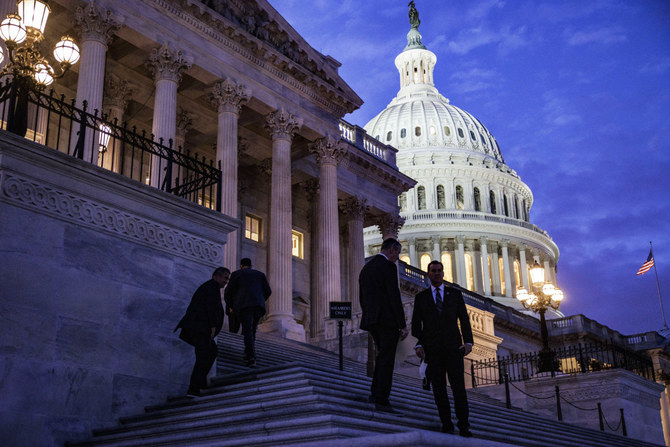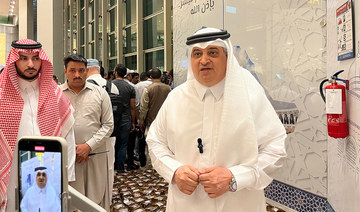WASHINGTON: President Joe Biden announced Thursday that he and Democrats in Congress have reached a “historic” framework for his sweeping domestic policy package. But he still needs to lock down votes from key colleagues for what’s now a dramatically scaled-back bill.
Eager to have a deal in hand before his departure late in the day for global summits, Biden made his case privately on Capitol Hill to House Democrats and publicly in a speech at the White House. He’s now pressing for a still-robust package — $1.75 trillion of social services and climate change programs — that the White House believes can pass the 50-50 Senate.
The fast-moving developments put Democrats closer to a hard-fought deal, but battles remain as they press to finish the final draft in the days and weeks ahead.
“Let’s get this done,” Biden exhorted.
“It will fundamentally change the lives of millions of people for the better,” he said about the package, which he badly wanted before the summits to show the world American democracy still works.
Together with a nearly $1 trillion bipartisan infrastructure bill, Biden claimed the infusion of federal investments would be a domestic achievement modeled on those of Franklin Roosevelt and Lyndon Johnson.
“I need your votes,” Biden told the lawmakers at the Capitol, according to a person who requested anonymity to discuss the private remarks.
But final votes will not be called for some time. The revised package has lost some top priorities, frustrating many lawmakers as the president’s ambitions make way for the political realities of the narrowly divided Congress.
Paid family leave and efforts to lower prescription drug pricing are now gone entirely from the package, drawing outrage from some lawmakers and advocates.
Still in the mix, a long list of other priorities: free prekindergarten for all youngsters, expanded health care programs — including the launch of a new $35 billion hearing aid benefit for people with Medicare — and $555 billion to tackle climate change.
There’s also a one-year extension of a child care tax credit that was put in place during the COVID-19 rescue and new child care subsidies. An additional $100 billion to bolster the immigration and border processing system could boost the overall package to $1.85 trillion if it clears Senate rules.
One pivotal Democratic holdout, Sen. Kyrsten Sinema of Arizona, said, “I look forward to getting this done.”
However, another, Joe Manchin of West Virginia, was less committal: “This is all in the hands of the House right now.”
The two Democrats have almost single-handedly reduced the size and scope of their party’s big vision, and are crucial to sealing the deal.
Republicans remain overwhelmingly opposed, forcing Biden to rely on the Democrats’ narrow majority in Congress with no votes to spare in the Senate and few in the House.
Taking form after months of negotiations, Biden’s emerging bill would still be among the most sweeping of its kind in a generation, modeled on New Deal and Great Society programs. The White House calls it the largest-ever investment in climate change and the biggest improvement to the nation’s health care system in more than a decade.
In his meeting with lawmakers at the Capitol, Biden made clear how important it was to show progress as he headed to the summits.
“We are at an inflection point,” he said. “The rest of the world wonders whether we can function.”
With US elections on the horizon, he said it’s not “hyperbole to say that the House and Senate majorities and my presidency will be determined by what happens in the next week.”
At one point, Biden “asked for a spirited, enthusiastic vote on his plan,” said Rep. Richard Neal, D-Mass.
Twice over the course of the hour-long meeting Democratic lawmakers rose to their feet and started yelling: “Vote, vote, vote,” said Rep. Gerald Connolly of Virginia.
Biden’s proposal would be paid for by imposing a new 5 percent surtax on income over $10 million a year, and instituting a new 15 percent corporate minimum tax, keeping with his plans to have no new taxes on those earning less than $400,000 a year, officials said. A special “billionaires tax” was not included.
Revenue to help pay for the package would also come from rolling back some of the Trump administration’s 2017 tax cuts, along with stepped-up enforcement of tax-dodgers by the IRS. Biden has vowed to cover the entire cost of the plan, ensuring it does not pile onto the debt load.
With the framework being converted to a 1,600-page legislative text for review, lawmakers and aides cautioned it had not yet been agreed to.
Rep. Pramila Jayapal, D-Washington, the progressive leader, said her caucus endorsed the framework, even as progressive lawmakers worked to delay further action. “We want to see the actual text because we don’t want any confusion and misunderstandings,” she said.
House Speaker Nancy Pelosi said Biden asked the House to vote on the related $1 trillion infrastructure bill, which already cleared the Senate but became tangled in deliberations over the broader bill. But Jayapal said she did not hear an urgent request from him, which emboldened progressives to halt the hoped-for Thursday vote.
“When the president gets off that plane we want him to have a vote of confidence from this Congress,” Pelosi told lawmakers, the person at the private meeting said.
But no votes were scheduled. Progressives have been withholding their support for the roads-and-bridges bill as leverage until they have a commitment that Manchin, Sinema and the other senators are ready to vote on Biden’s bigger package.
“Hell no,” said Rep. Rashida Tlaib, D-Michigan, about allowing the smaller infrastructure bill to pass.
Rep. Cori Bush, D-Missouri, shared her own story of making “pennies” at low-wage work, struggling to afford child care and wanting to ensure constituents have better.
“We need both bills to ride together. And we don’t have that right now,” Bush said. “I feel a bit bamboozled because this was not what I thought was coming today.”
Instead, Congress approved an extension to Dec. 3 of Sunday’s deadline for routine transportation funds that were at risk of expiring without the infrastructure bill.
The two holdout Democratic senators now hold enormous power, essentially deciding whether Biden will be able to deliver on the Democrats’ major campaign promises.
Sinema has been instrumental in pushing her party off a promise to undo the Republicans’ 2017 tax cuts. And Manchin’s resistance forced serious cutbacks to a clean energy plan, the elimination of paid family leave and the imposition of work requirements for parents receiving the new child care subsidies.
At the same time, progressives achieved one key priority — Vermont Independent Bernie Sanders’ proposal to provide hearing aid benefits for people on Medicare. However, his ideas to also include dental and vision care were left out.
Other expanded health care programs build on the Affordable Care Act by funding subsidies to help people buy insurance policies and coverage in states that declined the Obamacare program.
Overall, the new package also sets up political battles in future years. The enhanced child care tax credit expires alongside next year’s midterm elections, while much of the health care funding will expire in 2025, ensuring a campaign issue ahead of the next presidential election.
Biden announces ‘historic’ deal — but still must win votes
https://arab.news/ja4fb
Biden announces ‘historic’ deal — but still must win votes

- The revised package has lost some top priorities, frustrating many lawmakers as the president’s ambitions make way for the political realities of the narrowly divided Congress
German foreign minister says Russia will face consequences for cyberattack. NATO, EU show support

“This is absolutely intolerable and unacceptable and will have consequences”
BRUSSELS: Germany’s top diplomat on Friday said Russia will face consequences after accusing its military intelligence service of masterminding an “absolutely intolerable” cyberattack, as NATO and European Union member countries said they will not let Russia’s “malicious” behavior in cyberspace go unanswered.
Relations between Russia and Germany were already tense, with Germany providing military support to Ukraine in its ongoing war with Russia.
German Foreign Minister Annalena Baerbock said Russian state hackers were behind a cyberattack last year that targeted the Social Democrats, the leading party in the governing coalition.
“Russian state hackers attacked Germany in cyberspace,” she said at a news conference in the Australian city of Adelaide. “We can attribute this attack to the group called APT28, which is steered by the military intelligence service of Russia.”
“This is absolutely intolerable and unacceptable and will have consequences,” she said.
The Council of the EU later said that Czechia’s institutions have also been a target of the cyber campaign.
In a statement by the EU’s top diplomat, Josep Borrell, the bloc’s nations said they “strongly condemn the malicious cyber campaign conducted by the Russia-controlled Advanced Persistent Threat Actor 28 (APT28) against Germany and Czechia.”
The EU noted that it had previously imposed sanctions on individuals and entities responsible for APT28 attacks targeting the German parliament in 2015. It said it will not tolerate the continuation of such attacks, particularly with EU elections upcoming in June.
NATO said that APT28 targeted “other national governmental entities, critical infrastructure operators and other entities across the Alliance,” including in Lithuania, Poland, Slovakia and Sweden.
“We are determined to employ the necessary capabilities in order to deter, defend against and counter the full spectrum of cyberthreats to support each other, including by considering coordinated responses,” said the North Atlantic Council, the principal political decision-making body within NATO.
Baerbock is visiting Australia, New Zealand and Fiji, with the trip focusing on security policy as China pushes for influence in the Pacific region.
“The defense cooperation between Germany and Australia is close and we would like to deepen it further and together expand it, because we are in a situation where we face similar threats,” said Baerbock, who is the first German foreign minister to visit Australia in 13 years.
Discussions between Baerbock and Australia counterpart Penny Wong centered on the conflict in Gaza. “I think we all understand that the only path out of this cycle of violence that we see in the Middle East at such great cost is one that ultimately ensures a two-state solution,” Wong said.
Saudi team in Manila to transport Filipino conjoined twins for surgery in Riyadh

- Akhizah and Ayeesha Yusoph will fly to Saudi Arabia aboard medical aircraft on Sunday
- First Filipino conjoined twins underwent successful separation surgery in Riyadh in 2004
MANILA: A Saudi medical team has arrived in Manila to transport two 16-month-old girls to Riyadh, who will undergo separation surgery in the capital under the Kingdom’s flagship program for conjoined twins.
Akhizah and Ayeesha Yusoph were born in Panabo City, Davao Del Norte province on the southern island of Mindanao in December 2022. Their bodies share one liver.
“It was in the seventh month that I found out that they were conjoined, when I had my ultrasound. I was shocked,” the children’s mother, Hashima Yusoph, told Arab News.
“All I was thinking at that time was how I can take care of them, how I can do my best to be a mother.”
Not knowing how to help her newborns, the 19-year-old started to look for help to make sure the girls would have a life that is as normal as it could be. It was when they were five months old that a local charity connected her with the King Salman Humanitarian Aid and Relief Center.
KSrelief was established by King Salman in 2015 and is headed by Dr. Abdullah
Al-Rabeeah, one of the world’s most renowned pediatric surgeons.
The Saudi Conjoined Twins Program spearheaded by Al-Rabeeah has, since 1990, separated more than 130 children from 25 countries, who were born sharing internal organs with their twins.
Akhizah and Ayeesha will be transported to Riyadh on a special medical aircraft on Sunday.
A reception in their and the KSrelief team’s honor was held by Saudi Ambassador Hisham Al-Qahtani on Friday.
The ambassador said that all the medical procedures, transportation and their stay in the Kingdom during treatment will be covered by the Saudi government, following King Salman’s decree.

“This royal initiative comes as part of the Kingdom’s wise leadership commitment — may God preserve it — to care for and concentrate on humanitarian work,” he told the guests and media.
“This humanitarian work reflects one of the prominent achievements of the Kingdom in the field of separating conjoined twins and providing outstanding medical care, where the Kingdom has become a pioneer in the field.”
Akhizah and Ayeesha will fly to Saudi Arabia with their mother and grandmother.
“I’m so happy it’s finally happening ... The doctors said they are very fit to undergo surgery,” Hashima said. “This is really life changing for us.”
Conjoined twins are a rare phenomenon, estimated to occur once in every 50,000 to 60,000 births.
In March 2004, another set of Filipino conjoined twins, Ann and Mae Manzo, underwent separation surgery in Riyadh.
Joined at the abdomen, the pelvis and the perineum, they were successfully operated on in King Abdulaziz Medical City by Al-Rabeeah and his team of 50 doctors and nurses.
Police clear pro-Gaza sit-in at top Paris university

- Administrators had closed Sciences Po’s main buildings in response to the sit-in and called for remote classes instead
- Protests have been slow to spread to other prominent universities
PARIS: Police entered Paris’ Sciences Po university on Friday to remove dozens of students staging a pro-Gaza sit-in in the entrance hall, AFP journalists saw, as protests fire political debate about the Israeli-Palestinian conflict.
One student told reporters “around 50 students were still inside the rue Saint-Guillaume site” when police entered.
Bastien, 22, told AFP he and other protesters had been peacefully brought out in groups of 10 by officers.
Another, Lucas, studying for a master’s degree, said “some students were dragged and others gripped by the head or shoulders.”
Administrators had closed Sciences Po’s main buildings on Friday in response to the sit-in and called for remote classes instead.
They said “around 70 to 80 people” were occupying the foyer of the central Paris building.
Prime Minister Gabriel Attal’s office said such protests would be dealt with using “total rigour,” adding that 23 university sites had been “evacuated” on Thursday.
Students from the university’s Palestine Committee had earlier told reporters they faced a “disproportionate” response from police, who had blocked access to the site before moving in.
They also complained of a lack of “medical assistance” for seven students who had started a hunger strike “in solidarity with Palestinian victims.”
Widespread protests
Sciences Po, widely considered France’s top political science school, with alumni including President Emmanuel Macron, has seen student action at its at sites across the country in protest against the war in Gaza and the ensuing humanitarian crisis.
Protests have been slow to spread to other prominent universities, unlike in the United States — where demonstrations at around 40 facilities have at times spiralled into clashes with police and mass arrests.
But demonstrations have so far been more peaceful in France, home to the largest Jewish population outside Israel and the US, and to Europe’s largest Muslim community.
The University of California, Los Angeles, announced that Friday’s classes would be held remotely after police cleared a protest camp there and arrested more than 200 people.
Sciences Po administration took the same step for its Paris student body of between 5,000 and 6,000.
Protesters occupied the entrance hall in a “peaceful sit-in” following a debate on the Middle East with administrators on Thursday morning that their Palestine Committee dubbed “disappointing.”
The university’s interim administrator, Jean Basseres, refused student demands to “investigate” Science Po’s ties with Israeli institutions.
War on Gaza
The war in Gaza began after Palestinian militant group Hamas launched an attack on Israel on October 7 that resulted in the deaths of 1,170 people, mostly civilians, according to an AFP tally of Israeli official figures.
Israel estimates that 129 hostages seized by militants during their attack remain in Gaza. The Israeli military says it believes 34 of them are dead.
Israel’s relentless retaliatory offensive on Gaza has killed at least 34,596 people in the Palestinian territory, mostly women and children, according to the besieged enclave’s Hamas-run health ministry.
Outside the Sorbonne University, a few hundred meters (yards) from Sciences Po in central Paris, members of the Union of Jewish Students in France (UEJF) were setting up a “dialogue table” on Friday.
“We want to prove that it’s not true that you can’t talk about the Israeli-Palestinian conflict,” UEJF president Samuel Lejoyeux told broadcaster Radio J.
“To do that, we have to sideline those who single out Jewish students as complicit in genocide,” he added.
In the northeastern city of Lille, the ESJ journalism school was blocked off, an AFP reporter saw.
Students at the city’s nearby branch of Sciences Po had their identities checked before they were allowed in via a back entrance to sit exams.
Around 100 students had occupied a lecture hall at Science Po’s Lyon branch late on Thursday, while a blockade at a university site in nearby Saint-Etienne was cleared on Thursday morning by police.
Cockfights still rule the roost in India’s forest villages

- India is renowned for its fanatical cricket obsession but in the central state of Chhattisgarh, cockfighting draws the crowds
- When a cockfight is on calendar, hundreds of men walk far across rivers, through dense bushland and over hills for ringside view
KATEKALYAN: The swing of a talon and a flurry of feathers leaves a rooster motionless, a cockfight bout viewed as cruel by many but which binds disparate Indian forest communities together.
India is renowned for its fanatical cricket obsession but in the central state of Chhattisgarh, cockfighting draws the crowds.
“Earlier there was no other entertainment and it helped us meet people from other villages,” Raju, whose skill in raising fighting fowl has made him something of a local celebrity, told AFP.
“Even with all the changes around us today, the sport is still very popular,” the 32-year-old added.
The forests of Bastar district are home to numerous tribal communities living in scattered villages.
India has pumped millions of dollars into infrastructure development, and new roads and mobile phone towers have brought the forest’s inhabitants somewhat closer to the outside world.
Rugged terrain and the tyranny of distance in remote Bastar district still lend few occasions for these villages to interact with each other.
But when a cockfight is on the calendar, hundreds of men will walk far across rivers, through dense bushland and over hills to get a ringside view.
“I do nothing but organize fights, raise roosters and place bets,” Bhagat, 35, of Katekalyan village told AFP.
Last month was Katekalyan’s turn to host a bout, with men from out of town ringing the fence of the dirt enclosure where roosters spar.
Most cockfights are over in the blink of an eye, with the pre-game pageantry accounting for most of the action.
Bhagat and a rival rooster owner first hold their bird’s beak to beak to gauge whether they have the necessary hostility to battle.
Both men then use twine to fix sharp blades to the claws of their charges as the crowd shouts out their small wagers on the outcome.
Along with much of the rest of the world, cockfighting is banned in numerous Indian states on animal cruelty grounds.
People for the Ethical Treatment of Animals (PETA) India calls cockfighting “barbaric,” and campaigns to shut it down for good.
But the men living in Bastar’s forests see it as an integral part of their community fabric.
Roosters that survive multiple bouts are lauded alongside their owners.
Raju said the most enduring fighters were locally remembered with the same reverence that the rest of India holds for cricketing greats like former captain Sachin Tendulkar.
“Like you have a field for cricket, this is our field,” he said.
“And the winners get fame and respect, just like Sachin did by scoring all his runs.”
Bhagat said it always grieved him when one of his animals died in combat.
“When we lose a rooster in the fight, our hearts are in pain for a few days,” he said.
“But then we get drunk, and then there will be peace.”
Russian troops enter base housing US military in Niger, US official says

- The US and its allies have been forced to move troops out of a number of African countries following coups
WASHINGTON: Russian military personnel have entered an air base in Niger that is hosting US troops, a senior US defense official told Reuters, a move that follows a decision by Niger’s junta to expel US forces.
The military officers ruling the West African nation have told the US to withdraw its nearly 1,000 military personnel from the country, which until a coup last year had been a key partner for Washington’s fight against insurgents who have killed thousands of people and displaced millions more.
A senior US defense official, speaking on condition of anonymity, said Russian forces were not mingling with US troops but were using a separate hangar at Airbase 101, which is next to Diori Hamani International Airport in Niamey, Niger’s capital.
The move by Russia’s military, which Reuters was the first to report, puts US and Russian troops in close proximity at a time when the nations’ military and diplomatic rivalry is increasingly acrimonious over the conflict in Ukraine.
It also raises questions about the fate of US installations in the country following a withdrawal.
“(The situation) is not great but in the short-term manageable,” the official said.
Asked about the Reuters report, US Defense Secretary Lloyd Austin played down any risk to American troops or the chance that Russian troops might get close to US military hardware.
“The Russians are in a separate compound and don’t have access to US forces or access to our equipment,” Austin told a press conference in Honolulu.
“I’m always focused on the safety and protection of our troops ... But right now, I don’t see a significant issue here in terms of our force protection.”
The Nigerien and Russian embassies in Washington did not immediately respond to a request for comment.
The US and its allies have been forced to move troops out of a number of African countries following coups that brought to power groups eager to distance themselves from Western governments. In addition to the impending departure from Niger, US troops have also left Chad in recent days, while French forces have been kicked out of Mali and Burkina Faso.
At the same time, Russia is seeking to strengthen relations with African nations, pitching Moscow as a friendly country with no colonial baggage in the continent.
Mali, for example, has in recent years become one of Russia’s closest African allies, with the Wagner Group mercenary force deploying there to fight jihadist insurgents.
Russia has described relations with the United States as “below zero” because of US military and financial aid for Ukraine in its effort to defend against invading Russian forces.
The US official said Nigerien authorities had told President Joe Biden’s administration that about 60 Russian military personnel would be in Niger, but the official could not verify that number.
After the coup, the US military moved some of its forces in Niger from Airbase 101 to Airbase 201 in the city of Agadez. It was not immediately clear what US military equipment remained at Airbase 101.
The United States built Airbase 201 in central Niger at a cost of more than $100 million. Since 2018 it has been used to target Islamic State and Al-Qaeda affiliate Jama’at Nusrat Al-Islam wal Muslimeen (JNIM) fighters with armed drones.
Washington is concerned about Islamic militants in the Sahel region, who may be able to expand without the presence of US forces and intelligence capabilities.
Niger’s move to ask for the removal of US troops came after a meeting in Niamey in mid-March, when senior US officials raised concerns including the expected arrival of Russia forces and reports of Iran seeking raw materials in the country, including uranium.
While the US message to Nigerien officials was not an ultimatum, the official said, it was made clear US forces could not be on a base with Russian forces.
“They did not take that well,” the official said.
A two-star US general has been sent to Niger to try and arrange a professional and responsible withdrawal.
While no decisions have been taken on the future of US troops in Niger, the official said the plan was for them to return to US Africa Command’s home bases, located in Germany.


















